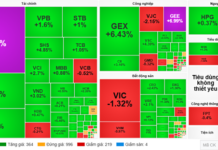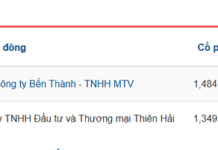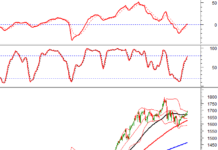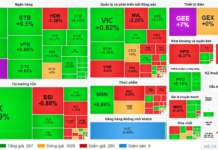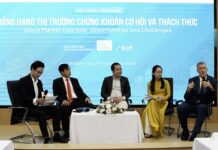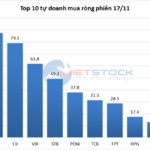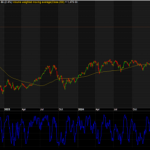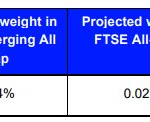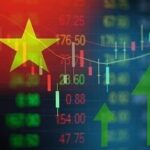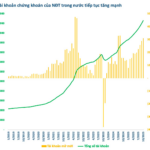At the seminar themed “Upgrading the Stock Market – Opportunities and Challenges” on November 26, experts highlighted that the upgrade to Secondary Emerging status by FTSE Russell marks a significant milestone for Vietnam’s stock market.
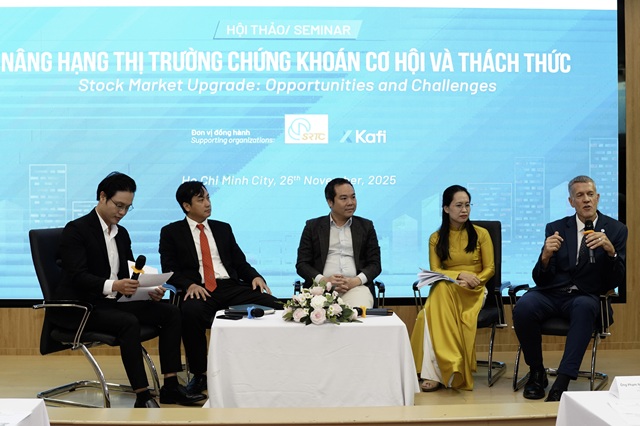
Speakers engaging in discussions at the seminar on “Upgrading the Stock Market – Opportunities and Challenges” on November 26.
|
According to Richard McGillivray, the core of the upgrade remains investor protection, alongside improvements in regulations and information disclosure standards, including sustainable development reporting.
The World Economic Forum’s (WEF) Global Risks Report identifies key risks over the next 2 and 10 years. In the short term, the top risk is the spread of misinformation, followed by extreme weather events and social polarization. These interconnected risks predominantly fall under the environmental and social categories of ESG.
Over a 10-year horizon, environmental risks escalate significantly. Misinformation remains a threat, and notably, risks associated with the adverse impacts of AI technology emerge.
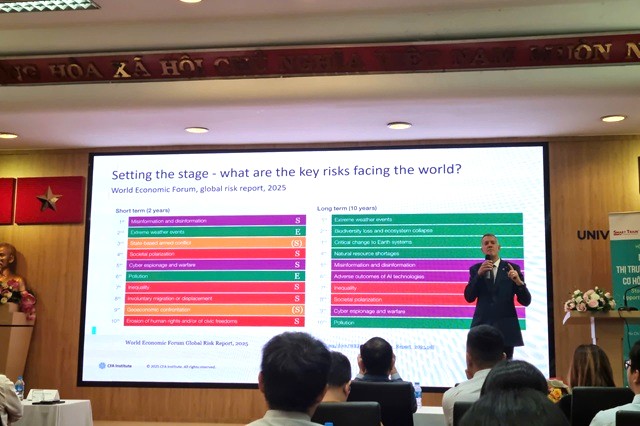 Richard McGillivray presenting on global risks ranked by severity in both short and long-term perspectives.
|
Global Risks and the Importance of ESG
Richard notes that social issues are inherently harder to predict compared to environmental ones, which are grounded in scientific data.
Atmospheric CO2 levels have surged by over 300% since 1950, leading to a temperature increase of more than 1.1°C and numerous significant issues. Vietnam aims for Net Zero by 2050, aligning with many other nations, but the path to reducing emissions by 2030 and 2050 is fraught with challenges.
Regarding temperature and natural disasters, Vietnam has experienced 13 storms this year, causing estimated damages of $2.6 billion, equivalent to 0.6% of GDP. Sea-level rise has also resulted in the loss of 80,000 hectares of agricultural land between 2023 and 2024, with damages amounting to 0.8% of GDP annually. Heatwaves have had a substantial impact, with the World Bank (WB) estimating a 3.2% GDP loss due to reduced labor productivity caused by extreme heat.
The WB predicts that if temperatures rise by 3°C by 2050, Vietnam could lose 12-14% of its GDP due to climate change, and approximately 14 million people may need to relocate from the Mekong Delta. Additionally, labor productivity in agriculture, construction, and manufacturing could decline by up to 50%.
The pressure is immense as global policies are steering the world toward a 3°C warming scenario, unless nations accelerate their transition efforts. Investors are increasingly questioning the extent of corporate responsibility for emissions and the necessary emission reduction targets.
Globally, regulations are tightening, with the EU implementing the Carbon Border Adjustment Mechanism (CBAM) from 2026, and Singapore imposing a $25/ton CO2 tax, set to rise to $45/ton next year. Companies within international supply chains will face significant impacts.
During the discussion, a representative from CFA Institute pointed out that ESG compliance increases costs for businesses, stemming from emission-related expenses and regulatory risks (such as water usage limits and environmental impacts). However, the more critical question is what businesses should do.
Businesses must focus on efficiency, including technological innovation, improved production processes, optimized waste management, enhanced productivity, and a shift toward environmentally friendly products and services.
“I view ESG as an opportunity rather than a burden; companies that adapt well will grow in value more rapidly,” shared Richard.
Echoing this sentiment, Ms. Trần Thị Thanh An – Deputy Head of the Securities Research and Training Center (SRTC) in Ho Chi Minh City, highlighted the measurable benefits of ESG compliance, which far outweigh the associated costs.
Specifically, ESG-compliant businesses gain priority access to green credit and enjoy preferential lending rates. Attracting investment becomes easier, as many funds exclusively invest in ESG-compliant companies.
Operational costs are also reduced through recycling projects and circular economy initiatives, which lower raw material expenses and reduce labor compensation costs due to better risk management.
In terms of governance, when businesses are transparent, markets become transparent, fostering trust and attracting foreign capital in the new landscape. SRTC also emphasized the enhanced ability to attract top talent through effective governance.
 Ms. Trần Thị Thanh An (SRTC) emphasizes that the benefits of ESG compliance far exceed the costs.
|
According to Dr. Trần Tuấn Vinh – Deputy Head of the Finance Department at Ho Chi Minh City University of Banking (HUB), ESG-compliant businesses demonstrate significantly greater resilience to risks compared to non-compliant ones. Post-risk, ESG-compliant companies recover and grow more effectively, underscoring the sustainability of this model.
Dr. Vinh asserts that ESG is an irreversible trend, destined to grow stronger. Leading companies will garner more attention from partners, financial institutions, suppliers, and customers.
 Mr. Trần Tuấn Vinh (HUB) affirms that the ESG trend is irreversible and will continue to strengthen.
|
Technology as Both Solution and Risk
The second factor shaping the future of capital markets is technology. According to Richard, technology will enhance climate understanding, reduce emissions, and optimize resource use.
However, AI currently accounts for 3% of global emissions and is rising. Additionally, chip production and AI systems consume vast amounts of water. While technology facilitated COVID-19 vaccine development—a clear social benefit—it also generates misinformation, the top social risk.

Richard McGillivray (CFA Institute) sharing insights at the seminar.
|
The WEF reports that AI could displace 85 million jobs, particularly repetitive roles, but it will also create new opportunities, notably in finance. As Nvidia CEO Jensen Huang stated, “AI won’t take your job, but someone who knows how to use AI will.”
– 16:49 27/11/2025
Tracking the Whale Money on November 17th: Foreign Investors Net Sell for 9 Consecutive Sessions, Proprietary Traders Continue Net Buying
In the November 17th session, foreign investors continued their net selling streak, showing no signs of abating, with a focus on stocks such as STB, VHM, and VRE. Conversely, securities companies’ proprietary trading desks marked their second consecutive net buying session.
Which Blue-Chip Stocks Are Fueling Positive Market Sentiment?
Amidst recent market turbulence, numerous large-cap stocks have plummeted by 15–25% in just weeks, casting a shadow of caution over investor sentiment. Yet, amidst this volatility, select billion-dollar stocks have demonstrated remarkable resilience, rebounding sooner than the broader market. These stalwarts have emerged as critical pillars of stability, offering a glimmer of hope as markets retreat into sensitive territory.
Market Upgrade Initiative: Ministry of Finance Outlines Pilot Roadmap for Short Selling and Day Trading
The Ministry of Finance has officially issued Decision No. 3761/QĐ-BTC dated November 6, 2025, outlining the implementation plan for Decision No. 2014/QĐ-TTg, which approves the project to upgrade Vietnam’s stock market.

